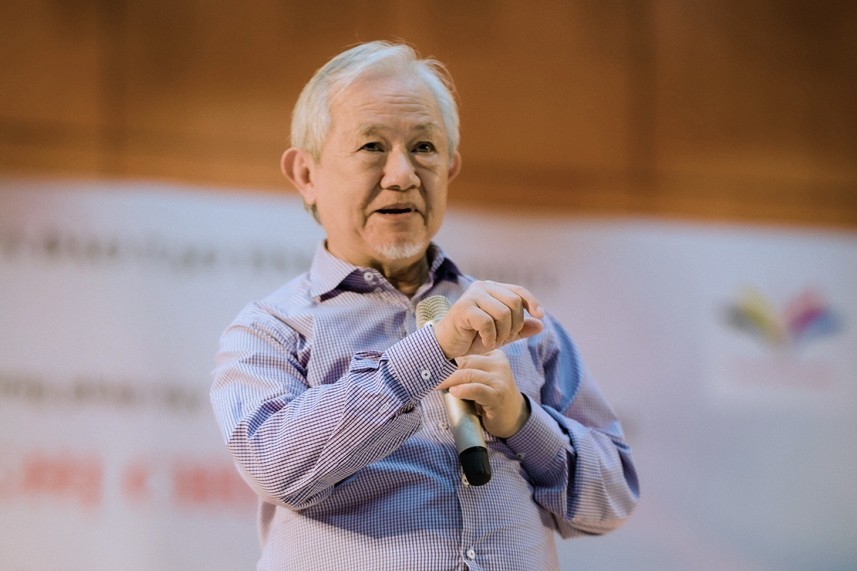
Prof. Phan Van Truong: Education to 'produce' high quality workforce
Latest
Prof. Phan Van Truong, a senior expert in international negotiations and an advisor to the French Government on international trade, made such a view when referring to the story of real-world education, practical learning and international integration.
 |
| Professor Phan Van Truong, an international negotiation expert. |
How do you think the world will change in the future?
In my opinion, in the next few years, the world will see significant changes in every aspect of life. Lab-grown meat became available. Cities are not necessarily a good place to live for the majority.
The Covid-19 pandemic has given us a taste of “collective but alone work”. Now that fabrics are revolutionizing, our clothes will have some special features such as antibacterial, rain-proof, lightweight, quick to dry...
The car industry will abandon gasoline technology while switching to electric vehicles, and there will be no drivers. Lots of people may leave off the “car culture” to ride a bicycle.
Instead of banks, just a few machines which can collect, manage and lend money are on every street corner. With the use of mobile payment, no more paper money is needed.
People will be under constant surveillance 24/7, because in every public place there are thousands of lenses with the face recognition ability of the entire population. The software will automatically check information. Therefore, there is no chance of lying.
Those changes will definitely have a significant impact on the method of education, aren’t they?
In fact, schooling is increasingly becoming obsolete in many countries. A student’s value is no longer judged on the amount of knowledge that he memorizes, since it has become useless. In the not-too-distant future, machines will take care of delivering any information we need and could even replace us in simple tasks.
The trend of education is to help students have more time to grow up, mature, realize their civic responsibilities and put knowledge into practice instead of just learning with their minds. These things are actually very important for global citizens but sometimes go unnoticed by schools.
This future’s mark is no longer 2050, but very likely sooner. Just like Covid-19 appeared in the winter of 2019, however, the world in 2021 reacted very quickly with the immediate invention of many vaccines. Thereby, it is difficult for the world to change without Viet Nam's contribution...
The current education market is opening up not only opportunities but also challenges for young people. In your opinion, how to create a brave and intelligent young generation as well as develop high-quality human resources?
In an extremely confusing and complicated world, young people who have worked hard, challenge themselves and jump into the fierce competition in the labour market certainly have considerable courage. There is no need to create more challenges to train these young people.
To be fair, our country is facing more difficulties than other countries, so I appreciate the strength and courage of the young people. If they are still fail, it is not necessarily their fault. In other words, that young people succeed without full support from stakeholders is rare, so policy issues need to be considered.
 |
| Education must be practical in learning and exams and with real talents. |
In response to the new trend as mentioned above, what should be done to have a practical education, towards international integration?
Education, or any subject, is no longer a separate domain, but rather a collaborative effort involving multiple agencies. Let’s permanently give up the wrong belief that education is the responsibility of the Ministry of Education and Training.
We should not ask young people if they are brave, talented or willing to make efforts. Our country, in fact, has a young generation that is incredibly flexible, intelligent and hardworking.
In your opinion, where should the problem of “practical in learning and exams and real talents” be addressed and what “bottlenecks” are there?
Real talent is always available, but in its “raw” form, has not received a proper education. Practical learning is tough because we often memorize things with the main purpose of passing the exam.
In terms of the exam itself, I believe that in the future, no organizations will hire solely on exam results. Instead, more and more enterprises will hire based on qualifications.
In fact, there are few tests that can discover a candidate’s genuine abilities such as thinking, communication, soft skills and teamwork. It is critical that we have the fortitude to face this reality, whether we like it or not.
So, how to have practical study, exams and assessment so that real capacity outweighs qualifications?
If you want the curriculum to be realistic, you must make the entire education marketable. Surveying firms, consulting educational programs in countries that have gone before us, and anticipating the future’s world before developing training programs are all examples of market research.
What are your recommendations for improving the quality of education and young human resources in the future to reach international standards?
I think it is impossible to increase the quality of education instantly because it must begin with the setting up of training programs, followed by teachers. Perhaps 80 percent of current educational thinking needs to be “swept away”.
What aspects should policymakers consider in order to make educational reform successful, Sir?
Looking up to educational needs, it is vital to consider the interests of children while keeping in mind the necessity to conserve resources and time, to open the self-study mindset and to give ample support for post-graduation learners.
Then, we need to remove the age restrictions, shorten the programs so that people can enter the workforce early, and eliminate time-consuming procedures and subjects just for exams. I think that’s real study.
Thank you!





















